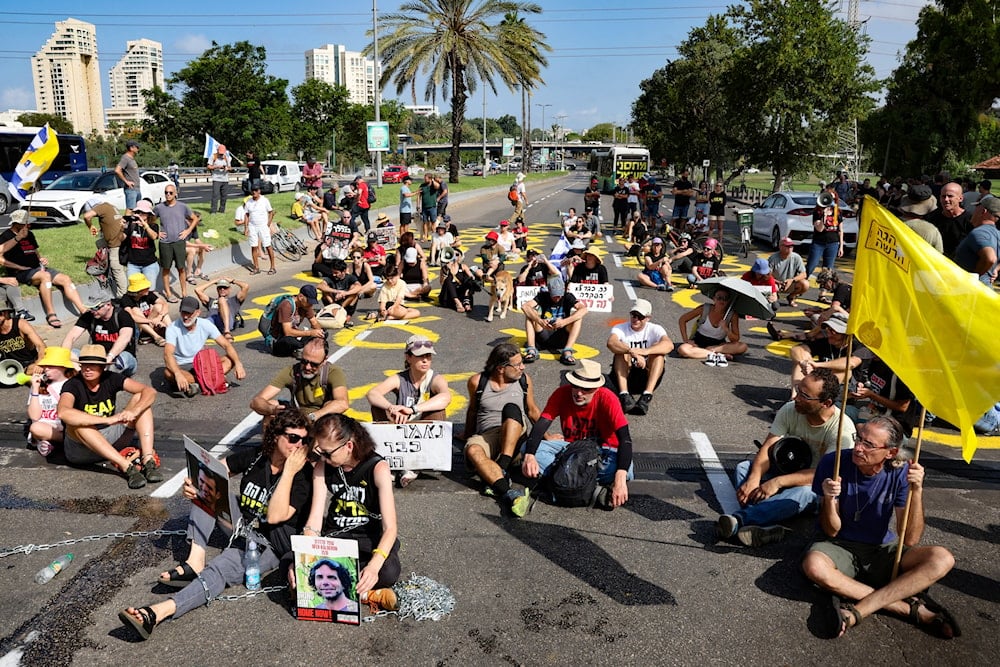'Why are they still in Gaza?': Settlers protest anew, demand deal
Families of captives held in Gaza have taken to the streets once again, blocking a main road in Tel Aviv.
-

Demonstrators sit on yellow ribbons painted on the ground as they block traffic on a main road during an anti-government protest calling for action to secure the release of Israeli captives held since October 7, 2023, in the Gaza Strip, in front of the Israeli Security Ministry in Tel Aviv on September 13, 2024. (AFP)
Relatives of Israeli captives held in Gaza and their supporters have blocked Namir Road in Tel Aviv, calling on the Israeli occupation government to complete an agreement to secure the captives' release, The Times of Israel reported on Friday.
The news website mentioned that protesters painted yellow ribbons along the road and chanted, "Why are they still in Gaza?" referring to the captives held by the Palestinian Resistance in the Strip since October 7, 2023.
Later, Israeli police arrived at the scene and attempted to disperse the demonstrators, according to The Times of Israel.
In a related context, the Israeli Channel 12 reported that the family of captive soldier Matan Angrest is set to release an audio recording of him from captivity during a demonstration in Tel Aviv on September 14.
A couple of days ago, a source within the Palestinian Resistance told Al Mayadeen that mediators had conveyed to the Resistance that the United States was unable to present a proposal acceptable to both "Israel" and Hamas.
According to the source, "Israel" pressured the US administration not to offer Hamas a ceasefire proposal without its approval, and had insisted that Washington omit any terms such as a "permanent ceasefire" or a "complete withdrawal" from the Gaza Strip from the agreement.
US President Joe Biden previously remarked that Israeli Prime Minister Benjamin Netanyahu "is not making enough effort" to reach an agreement for the release of Israeli captives held in Gaza.
Meanwhile, Israeli media cited a source familiar with the negotiations as saying that "Netanyahu prioritizes continuing the war" over retrieving the captives.
Netanyahu new demands to take talks back to square one: Hamas official
Most recently, a member of Hamas' political bureau, Izzat al-Rishq, affirmed that unless pressure is imposed on the Israeli Prime Minister to adhere to the agreed terms regarding the prisoner exchange deal, the Israeli captives will not see the light of day.
Al-Rishq indicated that "everyone knows that Netanyahu and his Nazi government are the sides obstructing the agreement."
He emphasized that the Palestinian Resistance's demands are clear and non-negotiable: a permanent cessation of Israeli aggression on Gaza and a complete withdrawal of Israeli occupation forces from the Strip.
The Hamas official warned against considering Netanyahu's new conditions as a basis for negotiation, as this would take the prisoner exchange and ceasefire talks back to square one.
Last week, a high-ranking leader within the Palestinian Resistance confirmed to Al Mayadeen that the Philadelphi Corridor remains the key obstacle in achieving both a ceasefire agreement in the Gaza Strip and a prisoner exchange deal.
The leader added that the Israeli occupation is adamant about not withdrawing from the Corridor during the first phase of the agreement, intending to postpone the withdrawal to the second phase.
He also noted that Hamas informed mediators of its categorical rejection of allowing occupation forces to remain in the area during the initial 42 days of the agreement.
No active Resistance tunnels in Philadelphi Corridor: Israeli media
A significant point of contention has been Netanyahu's demand for Israeli military control over the Philadelphi Corridor at the border between the Gaza Strip and Egypt.
The Philadelphi Corridor includes the Rafah border crossing with Egypt which is crucial for aid delivery. It extends 12.6 kilometers from the Karem Abu Salem crossing to the Mediterranean Sea.
The Israeli Prime Minister claims the Corridor is crucial for Hamas' operations and insists on maintaining a military presence there as part of any agreement.
But Israeli media reported on Sunday, citing sources within the Israeli occupation military, that there is no active tunnel belonging to the Palestinian Resistance in the Corridor.
Security and military commentator for the Israeli Channel 12, Amir Bar-Shalom, revealed that the Israeli military "says it can afford to withdraw from the Philadelphi Corridor."
He further mentioned that he consulted multiple military sources, asking them, "Is there an active [Resistance] tunnel in the Philadelphi Corridor?" The consistent response was, "No."
Read more: Doha, Cairo asked Hamas to approve 'minor' proposal changes: Exclusive

 4 Min Read
4 Min Read










